Banking Royal Commission Essay: Ethical Issues in the Finance Industry
VerifiedAdded on 2022/09/09
|8
|1756
|16
Essay
AI Summary
This essay provides a comprehensive analysis of the 'Fees for No Service' case involving the Commonwealth Bank of Australia (CBA), as revealed by the Banking Royal Commission. It delves into the ethical issues, misconduct, and failures within the financial industry. The essay begins with a literature review on ethics, emphasizing its importance in financial decision-making and the relationship between finance managers and customers. It then defines ethical conduct and its significance in the finance sector, contrasting it with laws and regulations. The core of the essay examines the CBA case study, detailing the charging of fees for services not rendered, the categorization of affected customers, and the lack of proper oversight. The author reflects on how they, as a banker and decision-maker, would have approached the situation ethically, highlighting the importance of maintaining ethical considerations, banking policies, and client expectations. The essay concludes by referencing key sources related to ethics, banking, and the Royal Commission's findings, offering a critical examination of the issues and contributing to a broader understanding of ethical conduct in the finance industry.
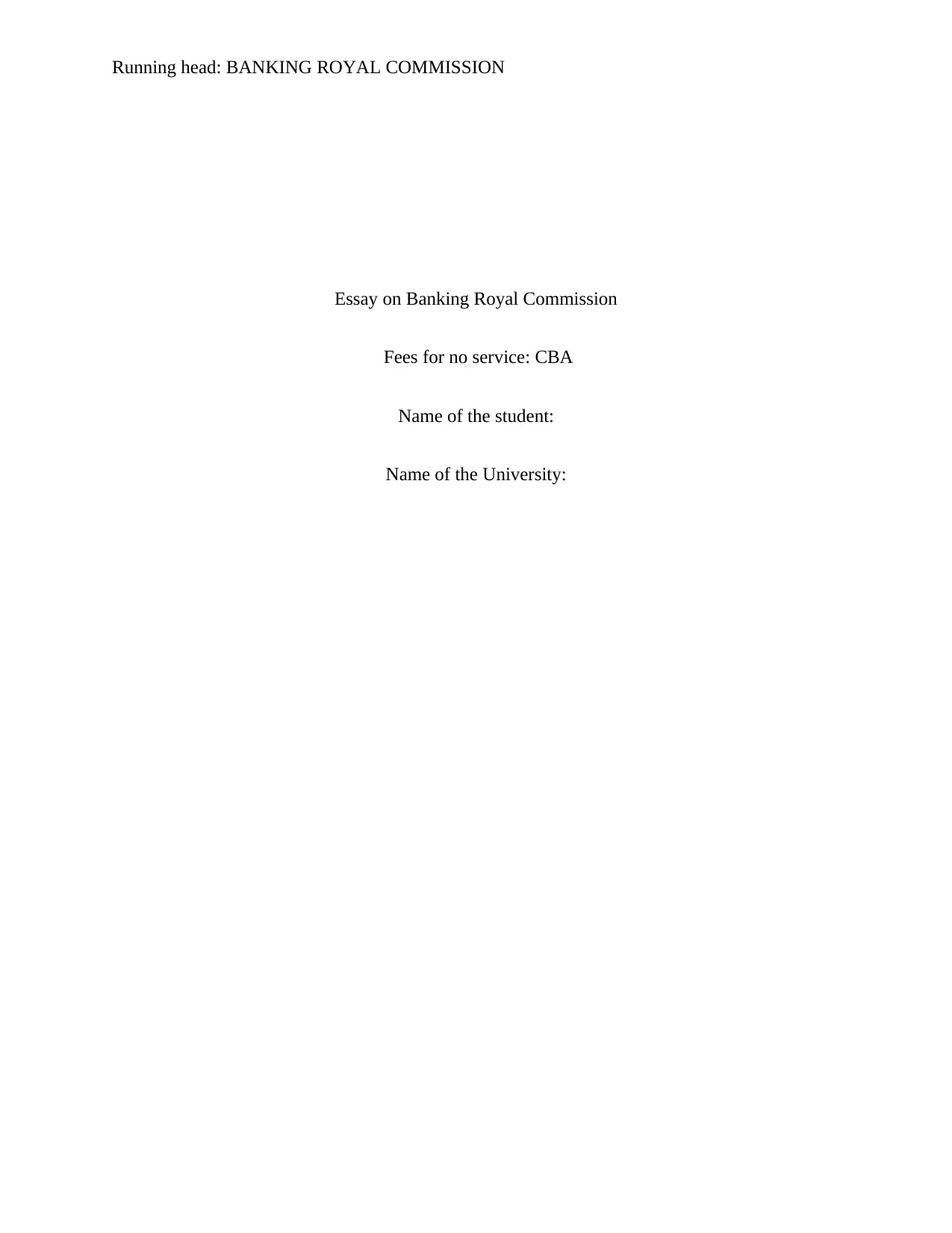
Running head: BANKING ROYAL COMMISSION
Essay on Banking Royal Commission
Fees for no service: CBA
Name of the student:
Name of the University:
Essay on Banking Royal Commission
Fees for no service: CBA
Name of the student:
Name of the University:
Paraphrase This Document
Need a fresh take? Get an instant paraphrase of this document with our AI Paraphraser
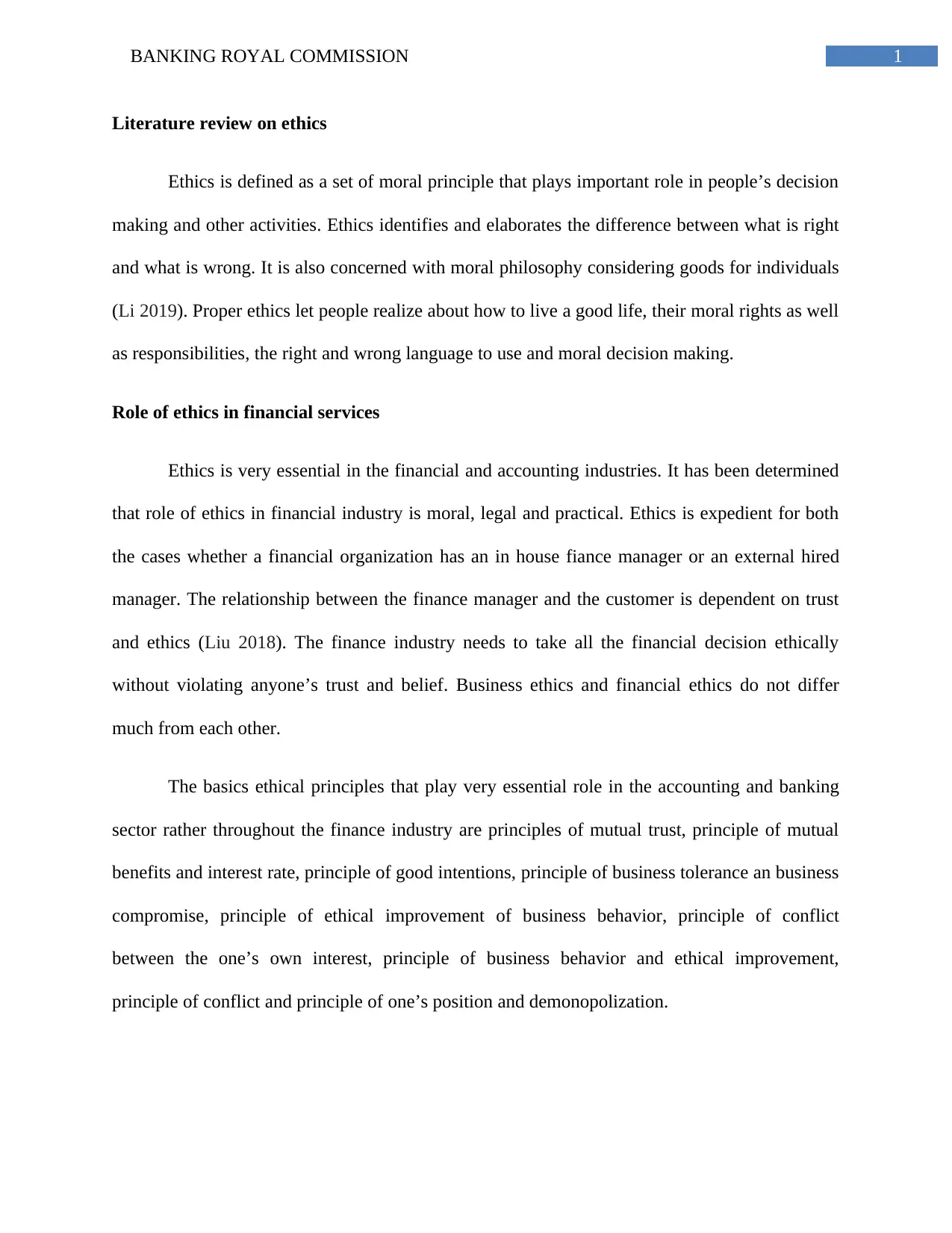
1BANKING ROYAL COMMISSION
Literature review on ethics
Ethics is defined as a set of moral principle that plays important role in people’s decision
making and other activities. Ethics identifies and elaborates the difference between what is right
and what is wrong. It is also concerned with moral philosophy considering goods for individuals
(Li 2019). Proper ethics let people realize about how to live a good life, their moral rights as well
as responsibilities, the right and wrong language to use and moral decision making.
Role of ethics in financial services
Ethics is very essential in the financial and accounting industries. It has been determined
that role of ethics in financial industry is moral, legal and practical. Ethics is expedient for both
the cases whether a financial organization has an in house fiance manager or an external hired
manager. The relationship between the finance manager and the customer is dependent on trust
and ethics (Liu 2018). The finance industry needs to take all the financial decision ethically
without violating anyone’s trust and belief. Business ethics and financial ethics do not differ
much from each other.
The basics ethical principles that play very essential role in the accounting and banking
sector rather throughout the finance industry are principles of mutual trust, principle of mutual
benefits and interest rate, principle of good intentions, principle of business tolerance an business
compromise, principle of ethical improvement of business behavior, principle of conflict
between the one’s own interest, principle of business behavior and ethical improvement,
principle of conflict and principle of one’s position and demonopolization.
Literature review on ethics
Ethics is defined as a set of moral principle that plays important role in people’s decision
making and other activities. Ethics identifies and elaborates the difference between what is right
and what is wrong. It is also concerned with moral philosophy considering goods for individuals
(Li 2019). Proper ethics let people realize about how to live a good life, their moral rights as well
as responsibilities, the right and wrong language to use and moral decision making.
Role of ethics in financial services
Ethics is very essential in the financial and accounting industries. It has been determined
that role of ethics in financial industry is moral, legal and practical. Ethics is expedient for both
the cases whether a financial organization has an in house fiance manager or an external hired
manager. The relationship between the finance manager and the customer is dependent on trust
and ethics (Liu 2018). The finance industry needs to take all the financial decision ethically
without violating anyone’s trust and belief. Business ethics and financial ethics do not differ
much from each other.
The basics ethical principles that play very essential role in the accounting and banking
sector rather throughout the finance industry are principles of mutual trust, principle of mutual
benefits and interest rate, principle of good intentions, principle of business tolerance an business
compromise, principle of ethical improvement of business behavior, principle of conflict
between the one’s own interest, principle of business behavior and ethical improvement,
principle of conflict and principle of one’s position and demonopolization.
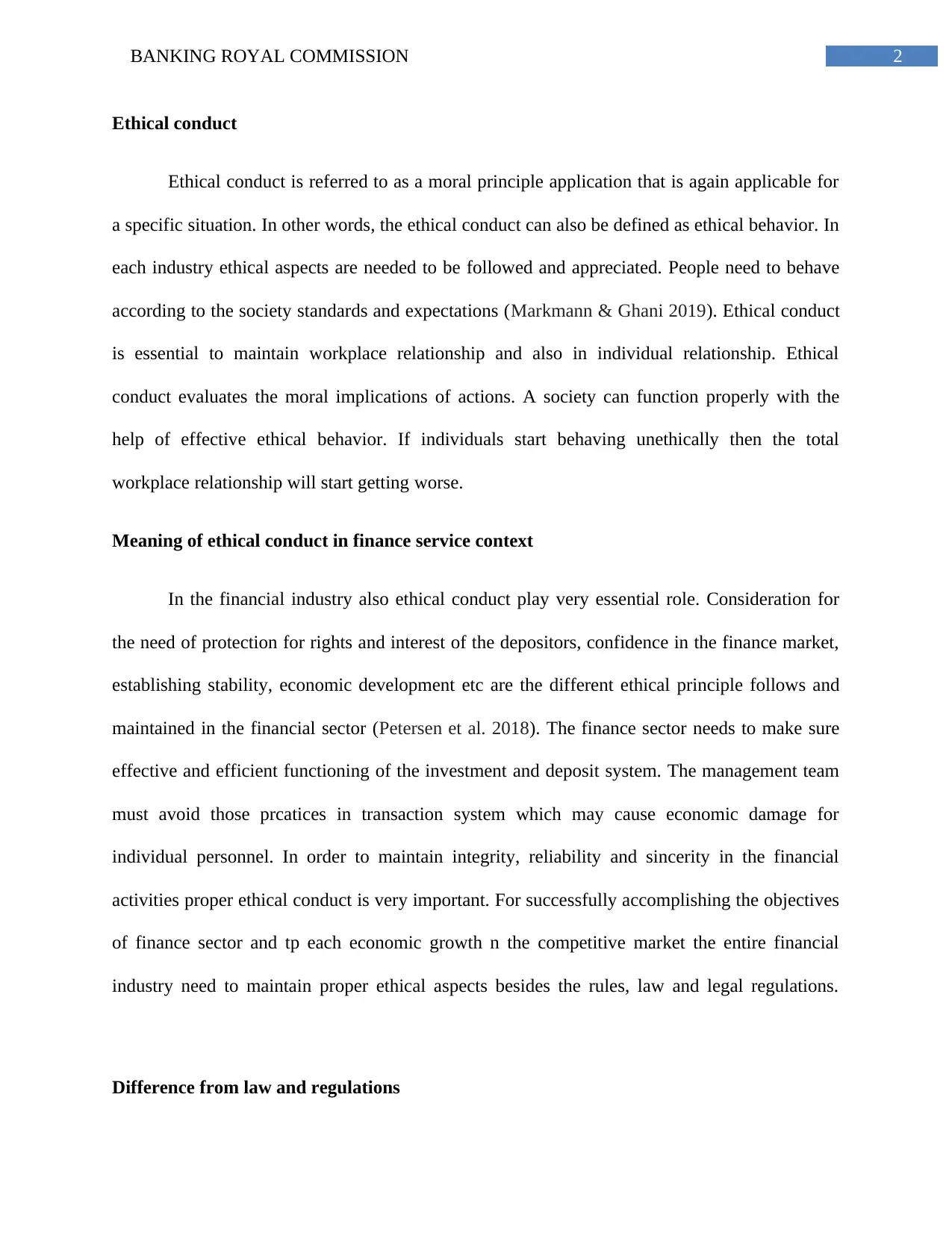
2BANKING ROYAL COMMISSION
Ethical conduct
Ethical conduct is referred to as a moral principle application that is again applicable for
a specific situation. In other words, the ethical conduct can also be defined as ethical behavior. In
each industry ethical aspects are needed to be followed and appreciated. People need to behave
according to the society standards and expectations (Markmann & Ghani 2019). Ethical conduct
is essential to maintain workplace relationship and also in individual relationship. Ethical
conduct evaluates the moral implications of actions. A society can function properly with the
help of effective ethical behavior. If individuals start behaving unethically then the total
workplace relationship will start getting worse.
Meaning of ethical conduct in finance service context
In the financial industry also ethical conduct play very essential role. Consideration for
the need of protection for rights and interest of the depositors, confidence in the finance market,
establishing stability, economic development etc are the different ethical principle follows and
maintained in the financial sector (Petersen et al. 2018). The finance sector needs to make sure
effective and efficient functioning of the investment and deposit system. The management team
must avoid those prcatices in transaction system which may cause economic damage for
individual personnel. In order to maintain integrity, reliability and sincerity in the financial
activities proper ethical conduct is very important. For successfully accomplishing the objectives
of finance sector and tp each economic growth n the competitive market the entire financial
industry need to maintain proper ethical aspects besides the rules, law and legal regulations.
Difference from law and regulations
Ethical conduct
Ethical conduct is referred to as a moral principle application that is again applicable for
a specific situation. In other words, the ethical conduct can also be defined as ethical behavior. In
each industry ethical aspects are needed to be followed and appreciated. People need to behave
according to the society standards and expectations (Markmann & Ghani 2019). Ethical conduct
is essential to maintain workplace relationship and also in individual relationship. Ethical
conduct evaluates the moral implications of actions. A society can function properly with the
help of effective ethical behavior. If individuals start behaving unethically then the total
workplace relationship will start getting worse.
Meaning of ethical conduct in finance service context
In the financial industry also ethical conduct play very essential role. Consideration for
the need of protection for rights and interest of the depositors, confidence in the finance market,
establishing stability, economic development etc are the different ethical principle follows and
maintained in the financial sector (Petersen et al. 2018). The finance sector needs to make sure
effective and efficient functioning of the investment and deposit system. The management team
must avoid those prcatices in transaction system which may cause economic damage for
individual personnel. In order to maintain integrity, reliability and sincerity in the financial
activities proper ethical conduct is very important. For successfully accomplishing the objectives
of finance sector and tp each economic growth n the competitive market the entire financial
industry need to maintain proper ethical aspects besides the rules, law and legal regulations.
Difference from law and regulations
⊘ This is a preview!⊘
Do you want full access?
Subscribe today to unlock all pages.

Trusted by 1+ million students worldwide
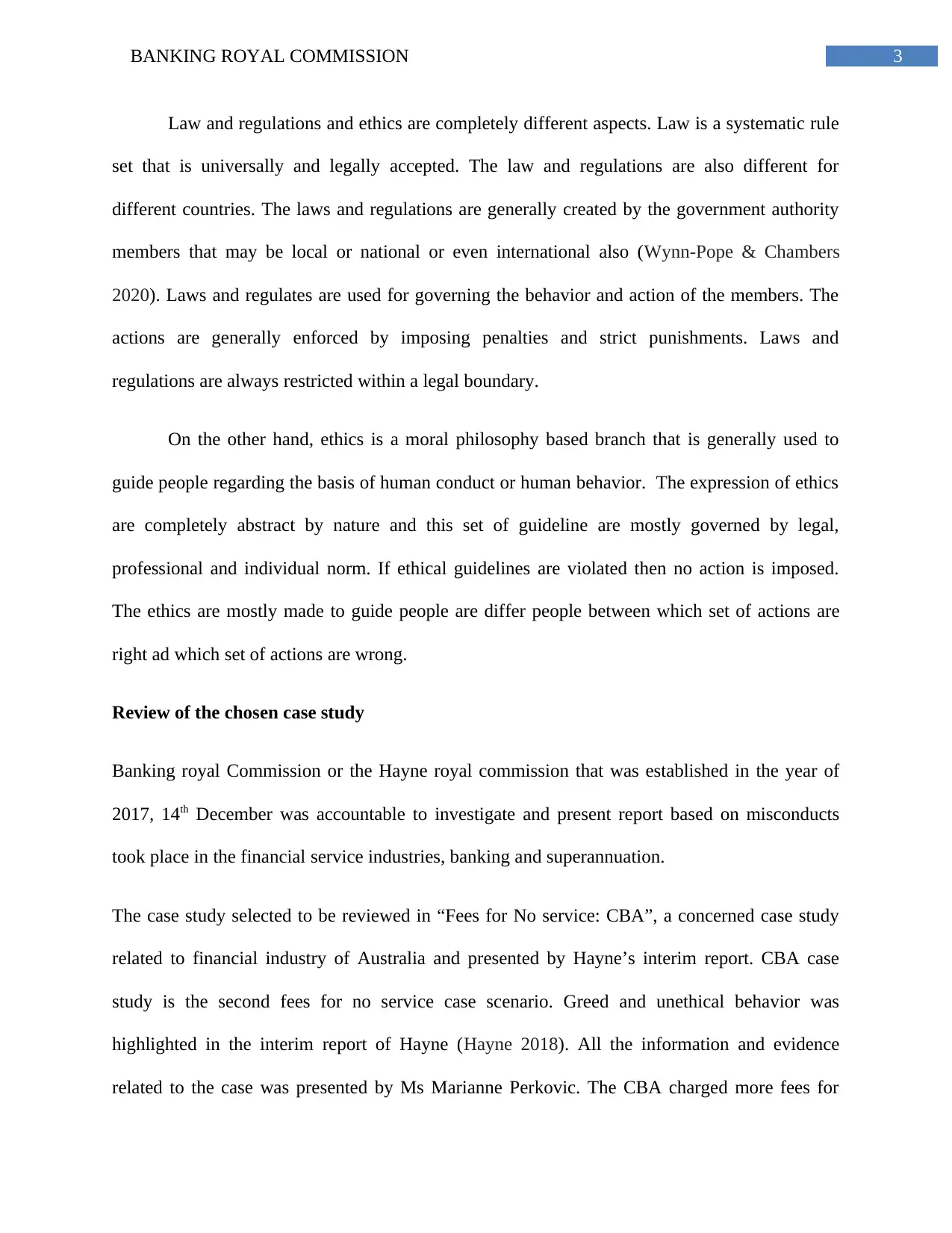
3BANKING ROYAL COMMISSION
Law and regulations and ethics are completely different aspects. Law is a systematic rule
set that is universally and legally accepted. The law and regulations are also different for
different countries. The laws and regulations are generally created by the government authority
members that may be local or national or even international also (Wynn-Pope & Chambers
2020). Laws and regulates are used for governing the behavior and action of the members. The
actions are generally enforced by imposing penalties and strict punishments. Laws and
regulations are always restricted within a legal boundary.
On the other hand, ethics is a moral philosophy based branch that is generally used to
guide people regarding the basis of human conduct or human behavior. The expression of ethics
are completely abstract by nature and this set of guideline are mostly governed by legal,
professional and individual norm. If ethical guidelines are violated then no action is imposed.
The ethics are mostly made to guide people are differ people between which set of actions are
right ad which set of actions are wrong.
Review of the chosen case study
Banking royal Commission or the Hayne royal commission that was established in the year of
2017, 14th December was accountable to investigate and present report based on misconducts
took place in the financial service industries, banking and superannuation.
The case study selected to be reviewed in “Fees for No service: CBA”, a concerned case study
related to financial industry of Australia and presented by Hayne’s interim report. CBA case
study is the second fees for no service case scenario. Greed and unethical behavior was
highlighted in the interim report of Hayne (Hayne 2018). All the information and evidence
related to the case was presented by Ms Marianne Perkovic. The CBA charged more fees for
Law and regulations and ethics are completely different aspects. Law is a systematic rule
set that is universally and legally accepted. The law and regulations are also different for
different countries. The laws and regulations are generally created by the government authority
members that may be local or national or even international also (Wynn-Pope & Chambers
2020). Laws and regulates are used for governing the behavior and action of the members. The
actions are generally enforced by imposing penalties and strict punishments. Laws and
regulations are always restricted within a legal boundary.
On the other hand, ethics is a moral philosophy based branch that is generally used to
guide people regarding the basis of human conduct or human behavior. The expression of ethics
are completely abstract by nature and this set of guideline are mostly governed by legal,
professional and individual norm. If ethical guidelines are violated then no action is imposed.
The ethics are mostly made to guide people are differ people between which set of actions are
right ad which set of actions are wrong.
Review of the chosen case study
Banking royal Commission or the Hayne royal commission that was established in the year of
2017, 14th December was accountable to investigate and present report based on misconducts
took place in the financial service industries, banking and superannuation.
The case study selected to be reviewed in “Fees for No service: CBA”, a concerned case study
related to financial industry of Australia and presented by Hayne’s interim report. CBA case
study is the second fees for no service case scenario. Greed and unethical behavior was
highlighted in the interim report of Hayne (Hayne 2018). All the information and evidence
related to the case was presented by Ms Marianne Perkovic. The CBA charged more fees for
Paraphrase This Document
Need a fresh take? Get an instant paraphrase of this document with our AI Paraphraser
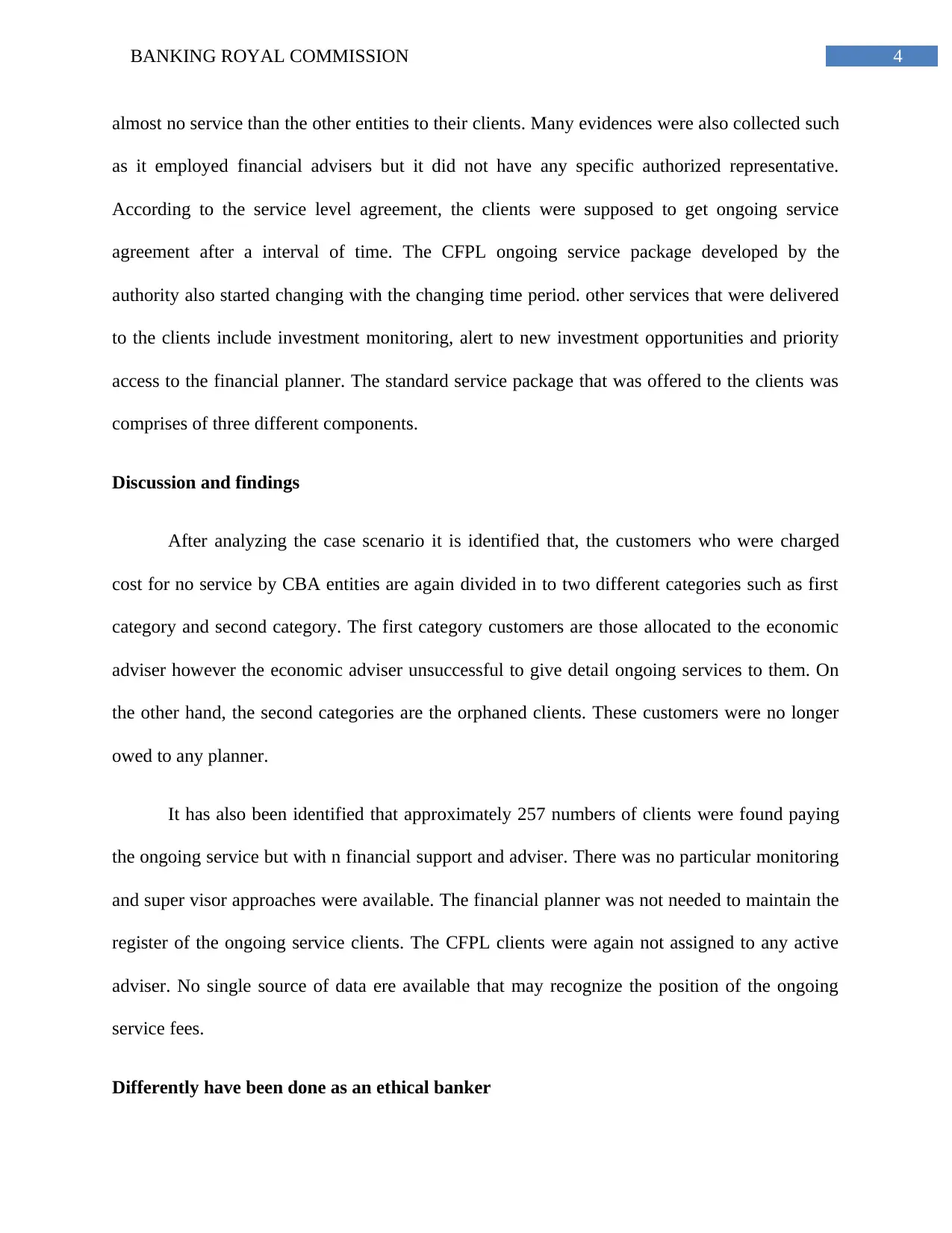
4BANKING ROYAL COMMISSION
almost no service than the other entities to their clients. Many evidences were also collected such
as it employed financial advisers but it did not have any specific authorized representative.
According to the service level agreement, the clients were supposed to get ongoing service
agreement after a interval of time. The CFPL ongoing service package developed by the
authority also started changing with the changing time period. other services that were delivered
to the clients include investment monitoring, alert to new investment opportunities and priority
access to the financial planner. The standard service package that was offered to the clients was
comprises of three different components.
Discussion and findings
After analyzing the case scenario it is identified that, the customers who were charged
cost for no service by CBA entities are again divided in to two different categories such as first
category and second category. The first category customers are those allocated to the economic
adviser however the economic adviser unsuccessful to give detail ongoing services to them. On
the other hand, the second categories are the orphaned clients. These customers were no longer
owed to any planner.
It has also been identified that approximately 257 numbers of clients were found paying
the ongoing service but with n financial support and adviser. There was no particular monitoring
and super visor approaches were available. The financial planner was not needed to maintain the
register of the ongoing service clients. The CFPL clients were again not assigned to any active
adviser. No single source of data ere available that may recognize the position of the ongoing
service fees.
Differently have been done as an ethical banker
almost no service than the other entities to their clients. Many evidences were also collected such
as it employed financial advisers but it did not have any specific authorized representative.
According to the service level agreement, the clients were supposed to get ongoing service
agreement after a interval of time. The CFPL ongoing service package developed by the
authority also started changing with the changing time period. other services that were delivered
to the clients include investment monitoring, alert to new investment opportunities and priority
access to the financial planner. The standard service package that was offered to the clients was
comprises of three different components.
Discussion and findings
After analyzing the case scenario it is identified that, the customers who were charged
cost for no service by CBA entities are again divided in to two different categories such as first
category and second category. The first category customers are those allocated to the economic
adviser however the economic adviser unsuccessful to give detail ongoing services to them. On
the other hand, the second categories are the orphaned clients. These customers were no longer
owed to any planner.
It has also been identified that approximately 257 numbers of clients were found paying
the ongoing service but with n financial support and adviser. There was no particular monitoring
and super visor approaches were available. The financial planner was not needed to maintain the
register of the ongoing service clients. The CFPL clients were again not assigned to any active
adviser. No single source of data ere available that may recognize the position of the ongoing
service fees.
Differently have been done as an ethical banker
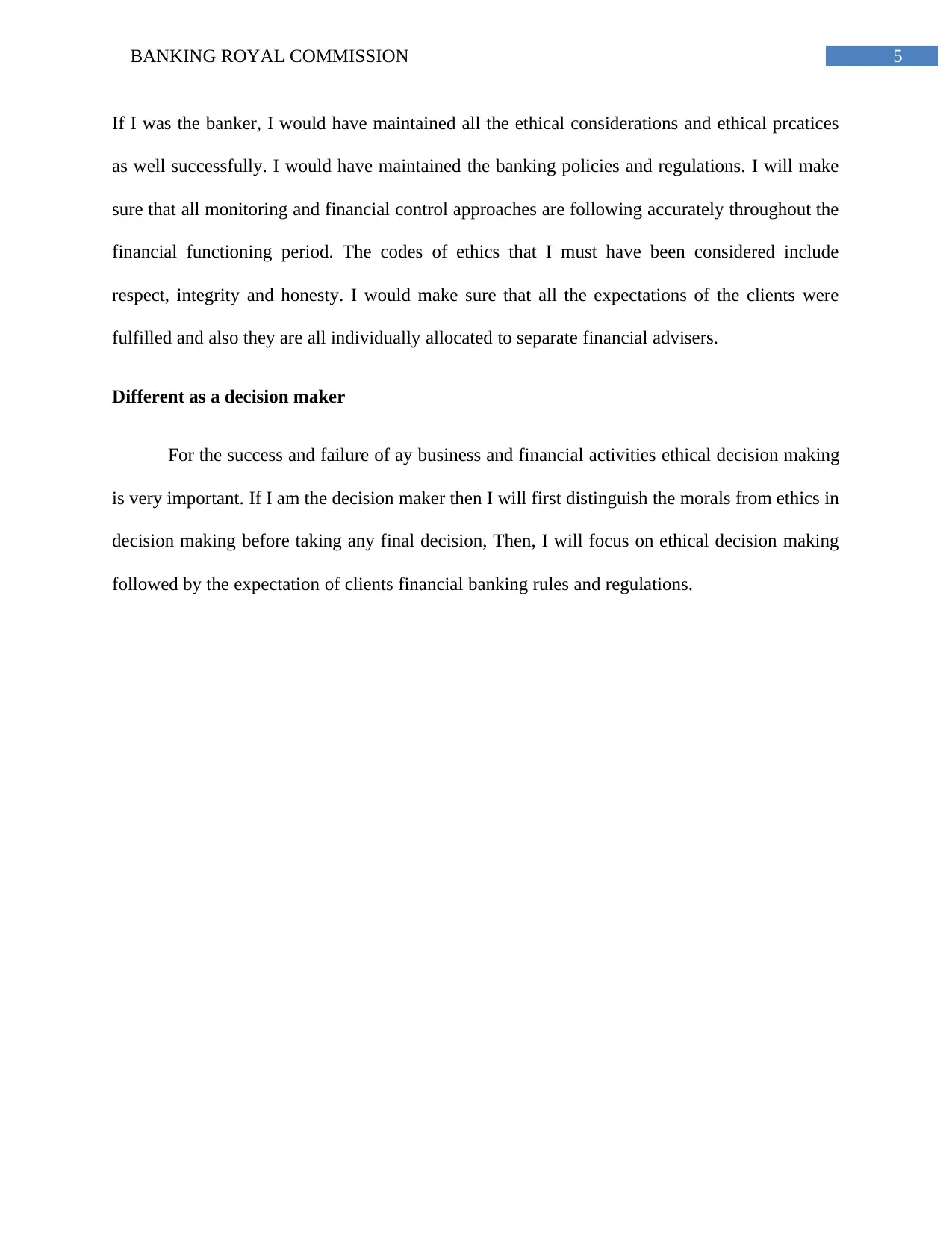
5BANKING ROYAL COMMISSION
If I was the banker, I would have maintained all the ethical considerations and ethical prcatices
as well successfully. I would have maintained the banking policies and regulations. I will make
sure that all monitoring and financial control approaches are following accurately throughout the
financial functioning period. The codes of ethics that I must have been considered include
respect, integrity and honesty. I would make sure that all the expectations of the clients were
fulfilled and also they are all individually allocated to separate financial advisers.
Different as a decision maker
For the success and failure of ay business and financial activities ethical decision making
is very important. If I am the decision maker then I will first distinguish the morals from ethics in
decision making before taking any final decision, Then, I will focus on ethical decision making
followed by the expectation of clients financial banking rules and regulations.
If I was the banker, I would have maintained all the ethical considerations and ethical prcatices
as well successfully. I would have maintained the banking policies and regulations. I will make
sure that all monitoring and financial control approaches are following accurately throughout the
financial functioning period. The codes of ethics that I must have been considered include
respect, integrity and honesty. I would make sure that all the expectations of the clients were
fulfilled and also they are all individually allocated to separate financial advisers.
Different as a decision maker
For the success and failure of ay business and financial activities ethical decision making
is very important. If I am the decision maker then I will first distinguish the morals from ethics in
decision making before taking any final decision, Then, I will focus on ethical decision making
followed by the expectation of clients financial banking rules and regulations.
⊘ This is a preview!⊘
Do you want full access?
Subscribe today to unlock all pages.

Trusted by 1+ million students worldwide
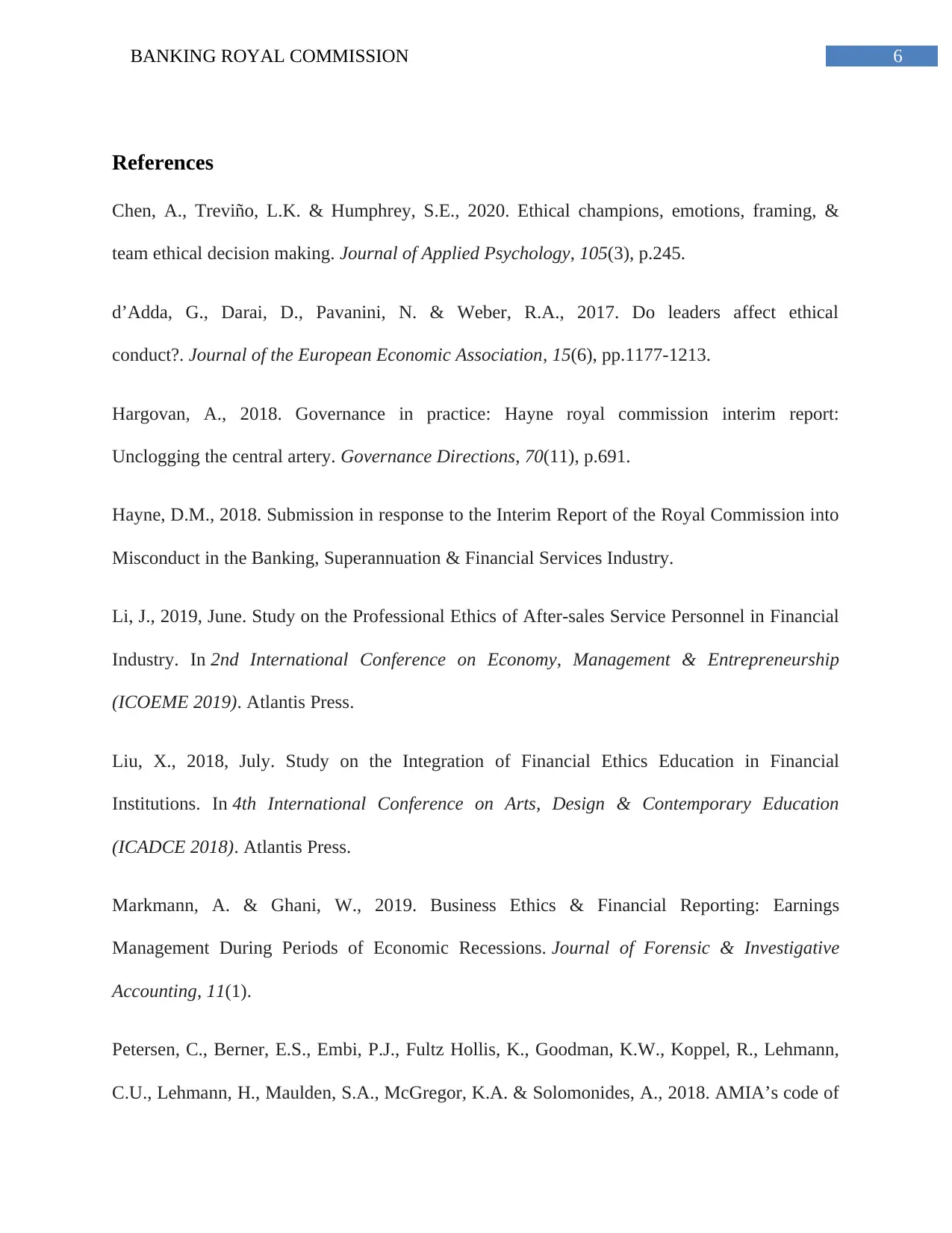
6BANKING ROYAL COMMISSION
References
Chen, A., Treviño, L.K. & Humphrey, S.E., 2020. Ethical champions, emotions, framing, &
team ethical decision making. Journal of Applied Psychology, 105(3), p.245.
d’Adda, G., Darai, D., Pavanini, N. & Weber, R.A., 2017. Do leaders affect ethical
conduct?. Journal of the European Economic Association, 15(6), pp.1177-1213.
Hargovan, A., 2018. Governance in practice: Hayne royal commission interim report:
Unclogging the central artery. Governance Directions, 70(11), p.691.
Hayne, D.M., 2018. Submission in response to the Interim Report of the Royal Commission into
Misconduct in the Banking, Superannuation & Financial Services Industry.
Li, J., 2019, June. Study on the Professional Ethics of After-sales Service Personnel in Financial
Industry. In 2nd International Conference on Economy, Management & Entrepreneurship
(ICOEME 2019). Atlantis Press.
Liu, X., 2018, July. Study on the Integration of Financial Ethics Education in Financial
Institutions. In 4th International Conference on Arts, Design & Contemporary Education
(ICADCE 2018). Atlantis Press.
Markmann, A. & Ghani, W., 2019. Business Ethics & Financial Reporting: Earnings
Management During Periods of Economic Recessions. Journal of Forensic & Investigative
Accounting, 11(1).
Petersen, C., Berner, E.S., Embi, P.J., Fultz Hollis, K., Goodman, K.W., Koppel, R., Lehmann,
C.U., Lehmann, H., Maulden, S.A., McGregor, K.A. & Solomonides, A., 2018. AMIA’s code of
References
Chen, A., Treviño, L.K. & Humphrey, S.E., 2020. Ethical champions, emotions, framing, &
team ethical decision making. Journal of Applied Psychology, 105(3), p.245.
d’Adda, G., Darai, D., Pavanini, N. & Weber, R.A., 2017. Do leaders affect ethical
conduct?. Journal of the European Economic Association, 15(6), pp.1177-1213.
Hargovan, A., 2018. Governance in practice: Hayne royal commission interim report:
Unclogging the central artery. Governance Directions, 70(11), p.691.
Hayne, D.M., 2018. Submission in response to the Interim Report of the Royal Commission into
Misconduct in the Banking, Superannuation & Financial Services Industry.
Li, J., 2019, June. Study on the Professional Ethics of After-sales Service Personnel in Financial
Industry. In 2nd International Conference on Economy, Management & Entrepreneurship
(ICOEME 2019). Atlantis Press.
Liu, X., 2018, July. Study on the Integration of Financial Ethics Education in Financial
Institutions. In 4th International Conference on Arts, Design & Contemporary Education
(ICADCE 2018). Atlantis Press.
Markmann, A. & Ghani, W., 2019. Business Ethics & Financial Reporting: Earnings
Management During Periods of Economic Recessions. Journal of Forensic & Investigative
Accounting, 11(1).
Petersen, C., Berner, E.S., Embi, P.J., Fultz Hollis, K., Goodman, K.W., Koppel, R., Lehmann,
C.U., Lehmann, H., Maulden, S.A., McGregor, K.A. & Solomonides, A., 2018. AMIA’s code of
Paraphrase This Document
Need a fresh take? Get an instant paraphrase of this document with our AI Paraphraser
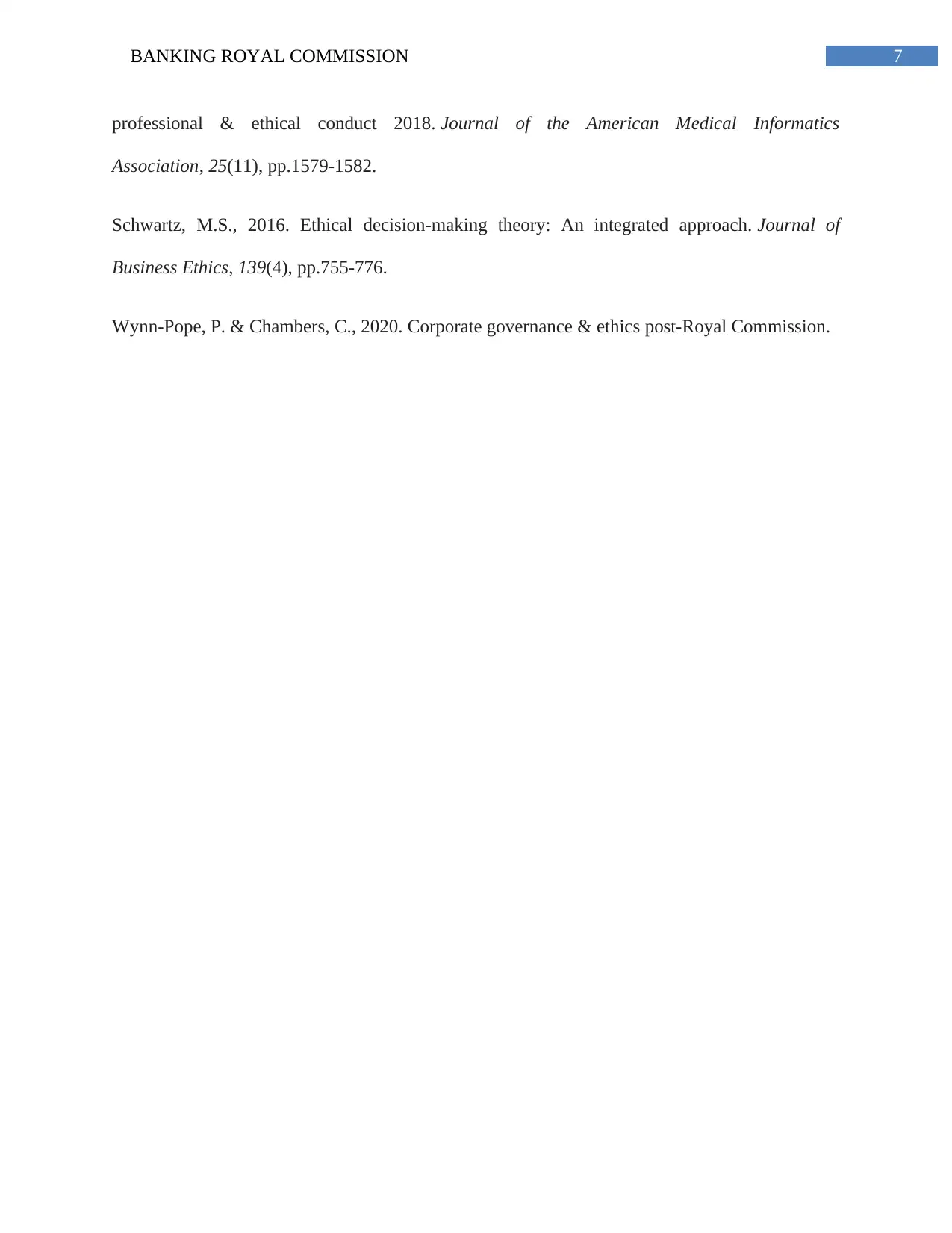
7BANKING ROYAL COMMISSION
professional & ethical conduct 2018. Journal of the American Medical Informatics
Association, 25(11), pp.1579-1582.
Schwartz, M.S., 2016. Ethical decision-making theory: An integrated approach. Journal of
Business Ethics, 139(4), pp.755-776.
Wynn-Pope, P. & Chambers, C., 2020. Corporate governance & ethics post-Royal Commission.
professional & ethical conduct 2018. Journal of the American Medical Informatics
Association, 25(11), pp.1579-1582.
Schwartz, M.S., 2016. Ethical decision-making theory: An integrated approach. Journal of
Business Ethics, 139(4), pp.755-776.
Wynn-Pope, P. & Chambers, C., 2020. Corporate governance & ethics post-Royal Commission.
1 out of 8
Related Documents
Your All-in-One AI-Powered Toolkit for Academic Success.
+13062052269
info@desklib.com
Available 24*7 on WhatsApp / Email
![[object Object]](/_next/static/media/star-bottom.7253800d.svg)
Unlock your academic potential
Copyright © 2020–2026 A2Z Services. All Rights Reserved. Developed and managed by ZUCOL.





